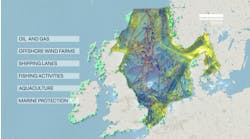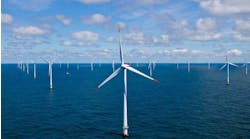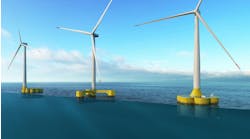Offshore staff
WASHINGTON, D.C. – The United States has an opportunity to accelerate offshore wind energy growth, and benefit from 28 new gigawatts of clean energy and $1.7 billion in US Treasury revenue by 2022, according to a new study from Wood Mackenzie.
Findings from this study confirm additional lease areas are needed to meet demand, reduce energy costs, increase competition, and ultimately generate thousands of jobs and billions in investment. Additionally, the findings offer guidance to decision-makers about new offshore wind leases, which can be a short-term solution to jump start recovery from a coronavirus pandemic-driven economic slowdown.
Commissioned by four energy industry groups, American Wind Energy Association, National Ocean Industries Association, New York Offshore Wind Alliance, and the Special Initiative on Offshore Wind at the University of Delaware, the study dives into the economic impact of offshore wind activities as a result of potential Bureau of Ocean Energy Management (BOEM) lease auctions in 2020, 2021, and 2022.
Based on existing activities and policy assumptions for future offshore wind development, two million acres of federal waters in the New York Bight, which includes parts of New Jersey, as well as California and the Carolinas, could be auctioned for commercial leases as early as this year as well as in 2021. According to Economic Impact Study of New Offshore Wind Lease Auctions by BOEM, such leasing could support 28 GW of offshore wind development and generate $1.2 billion in US Treasury revenue. Other auctions for lease areas in the Gulf of Maine and areas in California could happen in 2022 and would generate an additional $500 million in US Treasury revenue.
Significant capital investment will be put into the US economy to support offshore wind activities, the study finds. Total investment in the US offshore wind industry will be $17 billion by 2025, $108 billion by 2030, and $166 billion by 2035. From 2022 to 2035, capital investment of $42 billion will go to turbine manufacturers and the supply chain, $107 billion will go to the construction industry, and $8 billion will go to the transportation industry and ports. Annual capital investment for operations and maintenance activities will increase to $2.4 billion in 2035.
In addition to delivering clean energy to millions of households, the study indicates the offshore wind industry will also contribute a variety of economic benefits to the US economy, including supporting tens of thousands of jobs and billions of dollars in capital investment. If the assumed BOEM auctions in 2021 and 2022 happen, total full-time equivalent job creation from the resulting offshore wind activities, including development, construction, and operation will be about 80,000 jobs annually from 2025 to 2035.
NOIA President Erik Milito said: “American offshore wind is a generational opportunity. Infrastructure spending, energy security, and shovel-ready jobs with good wages will be unleashed. Importantly, offshore wind development will support jobs throughout the entire US. The same shipbuilders, heavy lift vessel operators, steel fabricators and countless other companies who built the Gulf of Mexico oil and gas sector stand ready to lend their expertise to the American offshore wind industry.”
08/04/2020



